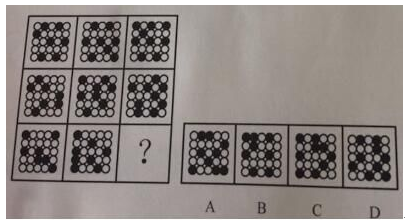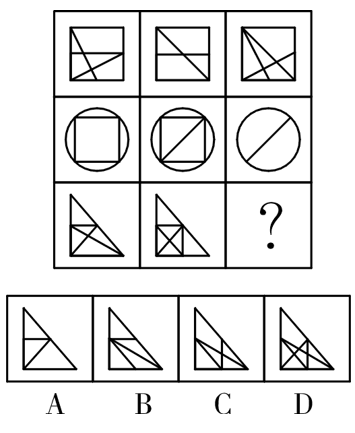阅读下列短文,从每题所给的A、B、C、D四个选项中,选出最佳选项,回答51-55题。 Next time a customer comes to your office, offer him a cup of coffee. And when you’re doing your holiday shopping online, make sure you’re holding a large glass of iced tea. The physical sensation(感觉) of warmth e
题目
阅读下列短文,从每题所给的A、B、C、D四个选项中,选出最佳选项,回答51-55题。 Next time a customer comes to your office, offer him a cup of coffee. And when you’re doing your holiday shopping online, make sure you’re holding a large glass of iced tea. The physical sensation(感觉) of warmth encourages emotional warmth, while a cold drink in hand prevents you from making unwise decisions—those are the practical lesson being drawn from recent research by psychologist John A. Bargh.
Psychologists have known that one person’s perception(感知) of another’s “warmth” is a powerful determiner in social relationships. Judging someone to be either “warm” or “cold” is a primary consideration, even trumping evidence that a “cold” person may be more capable. Much of this is rooted in very early childhood experiences, Bargh argues, when babies’ conceptual sense of the world around them is shaped by physical sensations, particularly warmth and coldness. Classic studies by Harry Harlow, published in 1958, showed monkeys preferred to stay close to a cloth “mother” rather than one made of wire, even when the wire “mother” carried a food bottle. Harlow’s work and later studies have led psychologists to stress the need for warm physical contact from caregivers to help young children grow into healthy adults with normal social skills.
Feelings of “warmth” and “coldness” in social judgments appear to be universal. Although no worldwide study has been done, Bargh says that describing people as “warm” or “cold” is common to many cultures, and studies have found those perceptions influence judgment in dozens of countries.
To test the relationship between physical and psychological warmth, Bargh conducted an experiment which involved 41 college students. A research assistant who was unaware of the study’s hypotheses(假设), handed the students either a hot cup of coffee, or a cold drink, to hold while the researcher filled out a short information form. The drink was then handed back. After that, the students were asked to rate the personality of “Person A” based on a particular description. Those who had briefly held the warm drink regarded Person A as warmer than those who had held the iced drink.
“We are grounded in our physical experiences even when we think abstractly,” says Bargh.
第16题:According to Paragraph 1, a person’s emotion may be affected by( )
A. the visitors to his office
B. the psychology lessons he has
C. his physical feeling of coldness
D. the things he has bought online
相似考题
更多“阅读下列短文,从每题所给的A、B、C、D四个选项中,选出最佳选项,回答51-55题。 Next time a customer ”相关问题
-
第1题:
从每小题的A、B、C、D四个选项中,选出可以填入空白处的最佳选项
6.What____ pity that you couldn’t be there to receive____ prize!
A.a;aB.the;a C.a;theD.the;the
正确答案:D
-
第2题:
请认真阅读下面各题,从题中所给的A、 B、 C 、D 、四个选项中,选出最佳选项,
21. The population of Jiangsu __ to more than twice what it was in 1949. The figure is now approaching 74 million.
A. has grown B. have grown C. grew D. are growing
正确答案:A
-
第3题:
从每题所给的A、B、C、D四个选项中,选出可以填入空白处的最佳选项。
21. John plays basketball well, ___his favorite sport is badminton.
A. so B. or C. yet D. for
正确答案:C
-
第4题:
请从所给的四个选项中,选出最符合左边五个图形一致性规律的选项:
 答案:B解析:【思路点拨】这是一道图形构成元素特征规律题。题目当中的五个给出图,并不存在图形构成数量、种类等方面的规律,五个图形在构成元素方面具备的唯一共同特征,是它们都是由曲线构成的,图形当中不存在直线。
答案:B解析:【思路点拨】这是一道图形构成元素特征规律题。题目当中的五个给出图,并不存在图形构成数量、种类等方面的规律,五个图形在构成元素方面具备的唯一共同特征,是它们都是由曲线构成的,图形当中不存在直线。
选项当中只有B选项是由曲线构成的,A、C、D三个选项的图形中都含有直线。故应选择B选项。 -
第5题:
从所给的四个选项中,选出最合适的一个填入问号处,使之呈现一定的规律性:
 A. A
A. A
B. B
C. C
D. D答案:D解析:曲直类加数量类。题干中给出图形都有直线和曲线,所以先从选项当中选择有曲有直的图形,排除AB,再看题干中图形面的个数为0、1、2、3、4,所以选择5个面的图形,因此答案为D选项。 -
第6题:
请从所给的四个选项中,选出最符合左边五个图形一致性规律的选项:(第一章用)

 答案:D解析:无论题干中是怎样的图形,都没有将圆分割开,只有D满足这样的规律。
答案:D解析:无论题干中是怎样的图形,都没有将圆分割开,只有D满足这样的规律。 -
第7题:
请从所给的四个选项中,选出最符合左边四个图形一致性规律的选项。( )
A.A B. B C. C D. D答案:D解析:左图的上半部分分别代表A、B、C、D,下半部分依次代表5,4,3,2,故答案为D。 -
第8题:
请从所给的四个选项中,选出最符合左边四个图形一致性规律的选项。 答案:D解析:前四个图形有两个特点:一是都是大图形中套小图形,二是小图形有部分与大图形相重合,由此观察选项,只有D符合。
答案:D解析:前四个图形有两个特点:一是都是大图形中套小图形,二是小图形有部分与大图形相重合,由此观察选项,只有D符合。 -
第9题:
从所给的四个选项中,选出一个填在问号处,使之呈现一定的规律性:
 答案:B解析:B [解析]本题属于样式类,考查的是困形的对称性。观察可知,題干中的五个图形 既是轴对称图形,又是中心对称图形,且有横轴和纵轴两条对称轴。四个选项中只有B项符 合此规律,正确答案为B。
答案:B解析:B [解析]本题属于样式类,考查的是困形的对称性。观察可知,題干中的五个图形 既是轴对称图形,又是中心对称图形,且有横轴和纵轴两条对称轴。四个选项中只有B项符 合此规律,正确答案为B。 -
第10题:
第二节完形填空(共15小题。每小题1分,计15分)
先通读下面的短文,掌握其大意,然后从后面各题所给的A、B、C、D四个选项中选出可以填入相应空白处的最佳答案。
(A)
Itisvery31forustostayingoodhealth.Wemusthavegoodeatingandsleepinghabitsinlife.Eatingmorefruitandveget
ables32goodforus.Wearesupposedto33atleast8hoursadayandtakepartinthehealthyactivitiesas34aspossible,
forexample,climbingmountains,runninginthemorningorswimming.Itisnecessarytokeep35andgetonwellwiththe
peoplearoundus.
31_______.
A.important
B.unnecessary
C.impossible
D.importance
正确答案:A
-
第11题:
A、请在下列各题所给的三个选项中选出最佳选项,并将所选答案填入答题卡内,完成21—35题。(15分)
21. Look! ________ man over there is Li Lei’s father.
A. An B. A C. The
正确答案:C
-
第12题:
二、阅读下面短文,从短文后各题所给四个选项(A、B、C、D)中选出能填入相应空白处的最佳选项。共3题,每题1分,共3分。 阅读下面短文,回答从的 114~116 题目。Martin Luther King Jr.was born in Georgia in 1 929.When was still a boy Martin learned that his people,the black Americans,when often treated differently from most of( )fellow Americans.Many could not attend good schools,get good jobs,or live in nice houses because of the color of their ( ) .Manin knew that in a free country this was wrong.He wanted to help his black brothers,( )he decided to go to school and become a minister.
第114题:( )
A.his
B.those
C.most
D.their
正确答案:D
-
第13题:
请从所给的四个选项中,选出最恰当的一项填入问号处,使之呈现一定的规律性。 答案:A解析:元素组成不同, 且无明显属性规律, 考虑数量规律。 观察发现, 题干中出现了许多三角形的面, 图一为一个三角形的面, 图二为两个三角形的面, 图三为三个三角形的面, 图四内部补上一根线条即为四个三角形的面,图五内部补上两根线条即为五个三角形的面, 所以? 处应为补上线条为六个三角形的面。 只有 A 项内部补上两根线条, 正好构成六个三角形。
答案:A解析:元素组成不同, 且无明显属性规律, 考虑数量规律。 观察发现, 题干中出现了许多三角形的面, 图一为一个三角形的面, 图二为两个三角形的面, 图三为三个三角形的面, 图四内部补上一根线条即为四个三角形的面,图五内部补上两根线条即为五个三角形的面, 所以? 处应为补上线条为六个三角形的面。 只有 A 项内部补上两根线条, 正好构成六个三角形。 -
第14题:
从所给的四个选项中,选择最符合左侧图形规律的一项:
 答案:D解析:
答案:D解析:
-
第15题:
从所给的四个选项中,选出最合适的一个填入问号处,使之呈现一定的规律性:
 答案:C解析:数量类加静态位置。九宫格横行寻找规律。每一行三幅图形黑点的个数分别为7、8、9个,所以先排除B选项。然后观察静态位置,第一行三幅图形的小黑点都是相离排布,没有连在一起的,第二行都有两个小黑点连在一起,第三行都有三个小黑点连在一起,所以答案选择C。
答案:C解析:数量类加静态位置。九宫格横行寻找规律。每一行三幅图形黑点的个数分别为7、8、9个,所以先排除B选项。然后观察静态位置,第一行三幅图形的小黑点都是相离排布,没有连在一起的,第二行都有两个小黑点连在一起,第三行都有三个小黑点连在一起,所以答案选择C。 -
第16题:
请从所给的四个选项中,选出最符合左边的四个图形一致性规律的选项。( )
A.A B. B C. C D. D答案:A解析:从前4个图可知线段数从6个减为3个,依次少一个,故答案为A。 -
第17题:
从所给的四个选项中,选出最合适的一个填入问号处,使之呈现一定的规律性:
 A.A
A.A
B.B
C.C
D.D答案:C解析:观察特征。元素组成相似,优先考虑样式。九宫格,横向规律较为常见,优先考虑。第一行,前两个图形去同求异得到第三个图形,第二行经验证符合此规律,第三行运用该规律可得C项。因此,选择C选项。
-
第18题:
单选题从所给的四个选项中,选出符合左边五个图形规律的一项。( )AA
BB
CC
DD
正确答案: C解析:
题中图形依次为封闭图形——开放图形——封闭图形——开放图形——封闭图形,依此规律,即所选图形应该是开放图形,因此答案选C。
